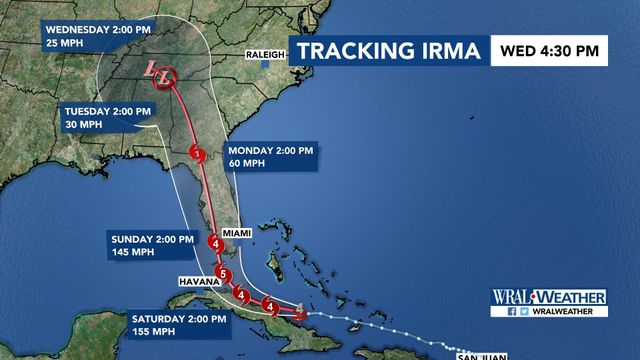Majority of NC removed from Irma's 'cone of uncertainty'; impacts will still be felt
Meteorologists are calling Hurricane Irma one of the strongest storms to ever form in the Atlantic, and Triangle residents are taking their statement seriously.
Posted — UpdatedAlthough the projected path of Irma, currently a Category 4 storm with winds at 155 mph, is not yet confirmed to severely impact North Carolina, Gov. Roy Cooper has declared a state of emergency, effective at 8 a.m. Thursday, to prepare for the storm.
"We don't know exactly where the storm will track and we don't know what parts of North Carolina will be impacted, but we do know it is time for North Carolinians to prepare for Irma," Cooper said in a press conference.
Cooper said that emergency officials are currently preparing for potential impact on all 100 counties in the state. Once Irma's final track becomes clear, steps will be taken to concentrate resources to the areas where they will be most needed, he said.
Latest projected path
The latest forecast on Friday morning shows wind speeds associated with Hurricane Irma had weakened down to 155 mph and WRAL meteorologist Elizabeth Gardner said further decrease in winds may be possible in the coming days, but it will still remain a "ferocious storm."
Irma is expected to move toward southeastern Bahama islands before it starts to turn father toward the north and northwest. Current path projections show that Irma could make landfall on Florida's coast late Sunday, near Miami, before turning west and affecting the entire Florida peninsula and into Georgia.
The National Weather Service issued a hurricane warning and a storm surge watch for southern Florida and the Florida Keys.
Potentially, the storm could move up the east coast of Florida and end up near the border of Georgia and South Carolina late Monday. Maze said the storm will remain Category 5 through Friday night before it begins to weaken slightly. If the storm reaches North Carolina, it will most likely be a Category 1 or a Category 2 hurricane by that time.
The latest forecast model from the National Hurricane Center on Thursday night showed that only the far western part of North Carolina remained in the storm's "cone of uncertainty" although the whole state will still likely see effects from the storm.
“The cone of uncertainty is out of Raleigh right now but we’ve seen so many track shifts we’re not going to let our guard down until it’s gone,” Maze said.
Local preparations underway
Despite the uncertainty for North Carolina, local businesses and families are already preparing for the storm's threat. Many stores by Thursday night were sold out of generators and water while local chapters of the Red Cross are preparing for the possibility of Irma.
"We know that resources are going to be strained. The good thing is that North Carolina knows what to do when these storms come. We'll be ready," he said.
"No matter where you are, no matter what your situation is, you need to get ready for the storm," he said.
Cumberland County experienced flooding during Hurricane Matthew and about 1,800 residents had to be rescued. This time around, emergency officials are holding meetings earlier and including more detail in their plans before a storm hits.
"One of our lessons we learned from Matthew is just get started, get prepared more than a typical amount of days ahead, not wait and see what the storm is going to do. Just go ahead and get everything in line," said Cumberland County Emergency Management coordinator Gene Booth.
A team will be meeting nonstop to plan until they know what path Irma will take. A meeting on Thursday included first responders, Cumberland County Schools and the Parks and Recreation Department.
"It was a discussion on sheltering. What shelters would we want to open? All of our partners are already well ahead of the game," Booth said.
One of the most important things for officials is remembering what didn't work in 2016 and fixing it before Irma arrives.
"I think with Matthew, kind of Murphy's Law played. If something could go or if a generator could fail, it did, so we are insuring extra backups to teh backups," Booth said.
The U.S. Army Corps of Engineers said officials are making slow releases at Falls Sam and Jordan Dam ahead of the storm, although water levels at both lakes were below normal levels Wednesday.
Major airlines have hurricane policies in effect as the hurricane approaches. At least one flight from Raleigh-Durham International Airport to Miami was cancelled Thursday. Officials are recommending passengers check airlines ahead of time, even for flights to outside the hurricane's path.
"While it's not a sure thing, we need to take this very seriously and prepare," Maze said.
• Credits
Copyright 2024 by Capitol Broadcasting Company. All rights reserved. This material may not be published, broadcast, rewritten or redistributed.






